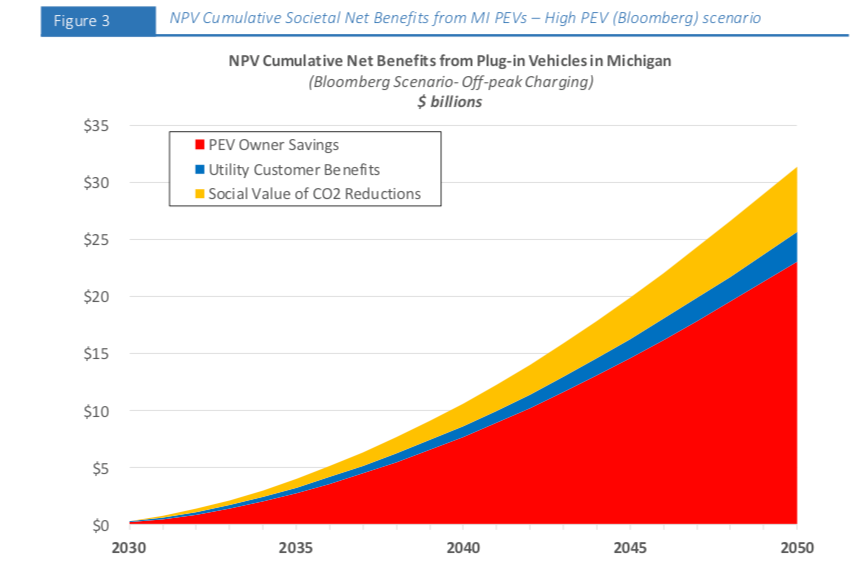Up to $23 million over the next three years in new investments for EV charging infrastructure across the state
By Elizabeth Harlow
Together, DTE Energy's Charging Forward and Consumers Energy's PowerMiDrive programs will devote up to $23 million over the next three years in new investments for EV charging infrastructure across the state.
If you drive a gasoline powered car, you probably know the tense feeling that comes when your fuel gauge approaches empty at an inconvenient moment--especially if the light blinks on just after you’ve passed a “last chance for gas” sign.
“Range anxiety” is a real phenomenon for any driver, and concern about where to charge represents one of the biggest current barriers to widespread electric vehicle (EV) adoption. Right now, plug-in opportunities limit trips, particularly for people who can’t charge at home or who need to travel longer distances where charging outlets are fewer and farther between.
Through its Charge Up Midwest campaign, the Ecology Center has partnered with key state and regional environmental organizations to help fix this gap. We’ve worked diligently to encourage Michigan’s largest utility companies and the Michigan Public Service Commission (MPSC) to make bold EV charging infrastructure commitments. After several years of work, we’re celebrating two new pilot programs that position Michigan to lead the Midwest in developing EV charging infrastructure.
After countless meetings, multiple technical conferences, and hundreds of pages of testimony and legal briefings, Michigan’s two largest utilities have finally both received green lights for game-changing EV charging programs. The MPSC recently approved DTE Energy’s $13 million Charging Forward program, and earlier this year approved a similar $10 million program by Consumers Energy.
These investments will bring as many as 2,000 new EV charging sites to Michigan highways, workplaces, and multi-unit housing developments, making it easier for more Michiganders to choose and use electric cars, no matter where they reside. DTE’s program will also assist transit agencies, school districts, and other fleet operators in going electric.
The programs will also support the installation of 5,000 charging stations at people’s homes, with pricing incentives to encourage EV charging at times that maximize grid efficiency. Most people use less electricity at night than during the day, leaving extra capacity on the electrical grid. EV charging represents an opportunity to take advantage of this unused capacity, as drivers can easily plug in overnight while cars are sitting idle. To encourage overnight charging, the utilities will offer time-of-use (TOU) rates--higher during peak times of day, but significantly lower at night.
A growing electric vehicle market can save Michigan families, drivers, and electricity customers billions of dollars over the next three decades--in electricity bills, vehicle ownership costs, and the costly damages of pollution. Cleaner, locally produced electricity will soon be a less expensive primary vehicle fuel than gasoline. And new EV home charging stations and TOU rates will help to reduce rates for all electricity customers--whether they own an EV or not--by adding new electrical load when it’s cheapest.

Greater use of electric vehicles will help to slash transportation-related emissions and promote public health, especially as we continue to transition to cleaner energy sources like wind and solar. Consumers Energy has estimated that based on its planned investments in renewable energy and decommissioning of coal-based power plants over the next two decades, an electric vehicle will be responsible for half the carbon emissions of a similar gasoline-powered vehicle by 2030, and more than 90% fewer emissions by 2040.
DTE and Consumers Energy will be rolling their charging programs out to the public in the coming months. Homeowners and businesses will be eligible for rebates to help cover the costs of installing the stations, with options to choose from a list of approved charging station suppliers. The utility companies will also conduct broad education and marketing efforts to let people know about the programs and their potential benefits.
The Ecology Center and its Charge Up Midwest partners are monitoring the new programs closely to make sure they meet environmental goals and community needs. For example, we pushed hard for charging at multi-unit dwellings and workplaces to be a priority focus. We believe electric transportation shouldn’t be a privilege only for homeowners in single family residences, and we know drivers need assurance of reliable and convenient charging opportunities at home or at work to choose electric with confidence. We also advocated for robust annual reporting and accountability mechanisms to help DTE, Consumers, and other partners learn from these pilot programs and modify them early to ensure maximum success.
We look forward to where these pilots will lead, and we’ll keep working to guide next steps in the right direction. We hope they lay the groundwork for an even bigger state charging network that puts electric range anxiety and combustion engine pollution in Michigan’s past. Cleaner travel is about to get a lot easier in Michigan, and it may not be long before you can take a fresh breath of relief in your car, unworried about stopping for gas or a place to plug in.


